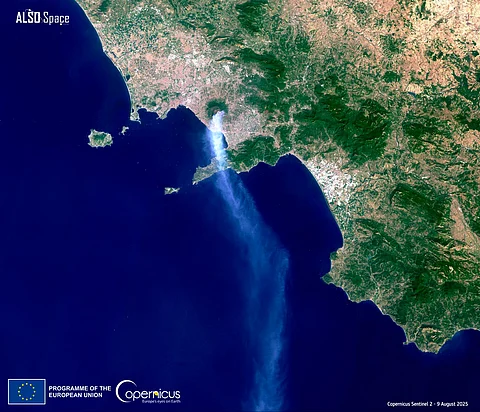

Tourist trails on Mount Vesuvius in southern Italy have been closed as firefighters battle a massive wildfire that has ravaged the volcano’s slopes, while France faces challenges containing its largest wildfire since 1949.
The Vesuvius blaze, which began a few days ago, has spread across a 3km front, destroying over 500 hectares of woodland and threatening biodiversity in the national park.
In France, a deadly fire in the Aude region has been contained, but officials warn of ongoing difficulties due to extreme heat and dry winds.
The Vesuvius wildfire, centered in the Terzigno pine forest and woodlands near Trecase, Ercolano, and Ottaviano, has prompted a robust response from Italian authorities.
Over 150 firefighters, supported by six Canadair planes and four helicopters, are working to control the blaze, with drones monitoring its spread.
Suspicions of arson have emerged, with Francesco Ranieri, mayor of Terzigno, suggesting “a criminal hand” may be responsible.
No evacuations have been ordered, but hundreds of residents slept outdoors Saturday night as thick smoke blanketed nearby towns, visible from Naples and Pompeii.
In France’s Aude department, firefighters have contained a massive wildfire that killed one person and injured several others.
Christian Pouget, prefect of Aude, noted that Sunday’s forecasted heatwave, with temperatures reaching 40°C, and dry winds would complicate efforts to fully control the fire.
The blaze, the largest in France since 1949, has underscored the growing wildfire risk across southern Europe, exacerbated by a prolonged heatwave.
Authorities remain on high alert as the region braces for continued extreme weather.
The wildfires in Italy and France highlight the increasing vulnerability of southern Europe to intense fires, driven by climate breakdown.
Hot, dry conditions and strong winds have fueled the blazes, with Italy reporting 56,000 hectares burned nationwide this year.
Vesuvius National Park’s trail closures aim to ensure safety and support firefighting efforts, while France’s containment success offers cautious optimism.
As heatwaves intensify, experts warn that such fires are becoming more frequent, extending wildfire seasons and threatening ecosystems and communities across the continent.